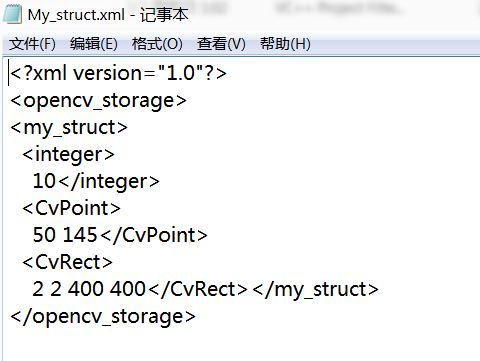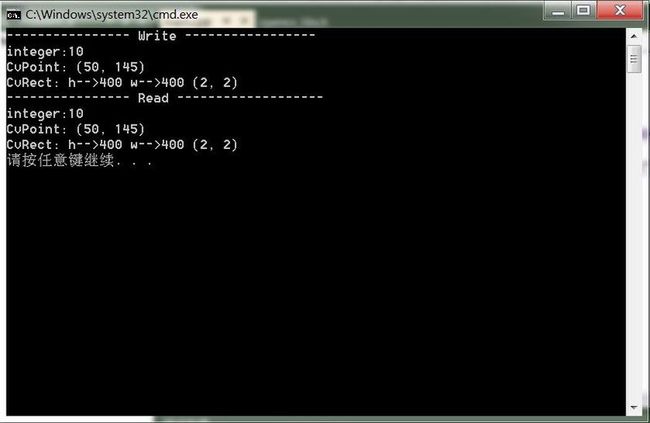《学习OpenCV》练习题第三章第八题a
1 #include <highgui.h> 2 #include <cv.h> 3 #include <stdio.h> 4 5 #pragma comment (lib,"opencv_calib3d231d.lib") 6 #pragma comment (lib,"opencv_contrib231d.lib") 7 #pragma comment (lib,"opencv_core231d.lib") 8 #pragma comment (lib,"opencv_features2d231d.lib") 9 #pragma comment (lib,"opencv_flann231d.lib") 10 #pragma comment (lib,"opencv_gpu231d.lib") 11 #pragma comment (lib,"opencv_haartraining_engined.lib") 12 #pragma comment (lib,"opencv_highgui231d.lib") 13 #pragma comment (lib,"opencv_imgproc231d.lib") 14 #pragma comment (lib,"opencv_legacy231d.lib") 15 #pragma comment (lib,"opencv_ml231d.lib") 16 #pragma comment (lib,"opencv_objdetect231d.lib") 17 #pragma comment (lib,"opencv_ts231d.lib") 18 #pragma comment (lib,"opencv_video231d.lib") 19 20 /* 21 *《学习OpenCV》第三章第八题a 22 * 完成时间:19:12 4/4 星期四 2013 23 */ 24 25 typedef struct my_struct 26 { 27 int i; 28 CvPoint point; 29 CvRect rect; 30 } MyStruct; 31 32 void write_my_struct(CvFileStorage * fs, const char* name, my_struct* ms) 33 { 34 //开始写数据 35 cvStartWriteStruct(fs, name, 6); 36 37 //写入一个 整数 38 cvStartWriteStruct(fs,"integer",CV_NODE_SEQ); 39 cvWriteInt(fs,NULL,ms->i); 40 cvEndWriteStruct(fs); 41 42 //写入cvpoint结构 43 cvStartWriteStruct(fs,"CvPoint",CV_NODE_SEQ); 44 cvWriteInt(fs,NULL,ms->point.x); 45 cvWriteInt(fs,NULL,ms->point.y); 46 cvEndWriteStruct(fs); 47 48 //写入rect结构体 49 cvStartWriteStruct(fs,"CvRect",CV_NODE_SEQ); 50 cvWriteInt(fs,NULL,ms->rect.x); 51 cvWriteInt(fs,NULL,ms->rect.y); 52 cvWriteInt(fs,NULL,ms->rect.height); 53 cvWriteInt(fs,NULL,ms->rect.width); 54 cvEndWriteStruct(fs); 55 56 //结束写数据 57 cvEndWriteStruct(fs); 58 } 59 60 void read_my_struct(CvFileStorage* fs, CvFileNode* ms_node, my_struct* ms) 61 { 62 // 读第一个整数 63 // 注意:这里应使用node->data.i的value来读取Integer 64 int i = cvGetFileNodeByName(fs, ms_node, "integer")->data.i; 65 ms->i = i; 66 67 // 读CvPoint结构 68 CvSeq *s1 = cvGetFileNodeByName(fs, ms_node, "CvPoint")->data.seq; 69 CvPoint point; 70 point.x= cvReadInt((CvFileNode*)cvGetSeqElem(s1,0)); 71 point.y= cvReadInt((CvFileNode*)cvGetSeqElem(s1,1)); 72 ms->point = point; 73 74 // 读取CvRect结构 75 CvSeq *s2 = cvGetFileNodeByName(fs, ms_node, "CvRect")->data.seq; 76 CvRect rect; 77 rect.x=cvReadInt((CvFileNode*)cvGetSeqElem(s2, 0)); 78 rect.y=cvReadInt((CvFileNode*)cvGetSeqElem(s2, 1)); 79 rect.width=cvReadInt((CvFileNode*)cvGetSeqElem(s2, 3)); 80 rect.height=cvReadInt((CvFileNode*)cvGetSeqElem(s2, 2)); 81 ms->rect = rect; 82 } 83 84 // 将MyStruct的值显示出来 85 void ShowStructValue(MyStruct* pvalue) 86 { 87 printf("integer:%d\n", pvalue->i); 88 printf("CvPoint: (%d, %d)\n", pvalue->point.x, pvalue->point.y ); 89 printf("CvRect: h-->%d\tw-->%d\t(%d, %d)\n", pvalue->rect.height, 90 pvalue->rect.width, pvalue->rect.x, pvalue->rect.y); 91 } 92 93 94 int main() 95 { 96 /* 写数据部分 */ 97 MyStruct struct_1; 98 struct_1.i = 10; 99 struct_1.point = cvPoint(50, 145); 100 struct_1.rect = cvRect(2, 2, 400, 400); 101 102 CvFileStorage* fs = cvOpenFileStorage("My_struct.xml", 0, CV_STORAGE_WRITE); 103 104 write_my_struct(fs, "my_struct", &struct_1); 105 cvReleaseFileStorage(&fs); 106 107 /* 读数据部分 */ 108 fs = cvOpenFileStorage("My_struct.xml", NULL, CV_STORAGE_READ ); 109 MyStruct struct_2; 110 CvFileNode *pnode = cvGetFileNodeByName(fs, NULL, "my_struct"); 111 112 read_my_struct( fs, pnode, &struct_2 ); 113 114 // 显示 115 printf("---------------- Write -----------------\n"); 116 ShowStructValue( & struct_1 ); 117 printf("---------------- Read -------------------\n"); 118 ShowStructValue( & struct_2); 119 120 cvReleaseFileStorage(&fs); 121 122 return 0; 123 }
相应的XML文件:
运行结果:

